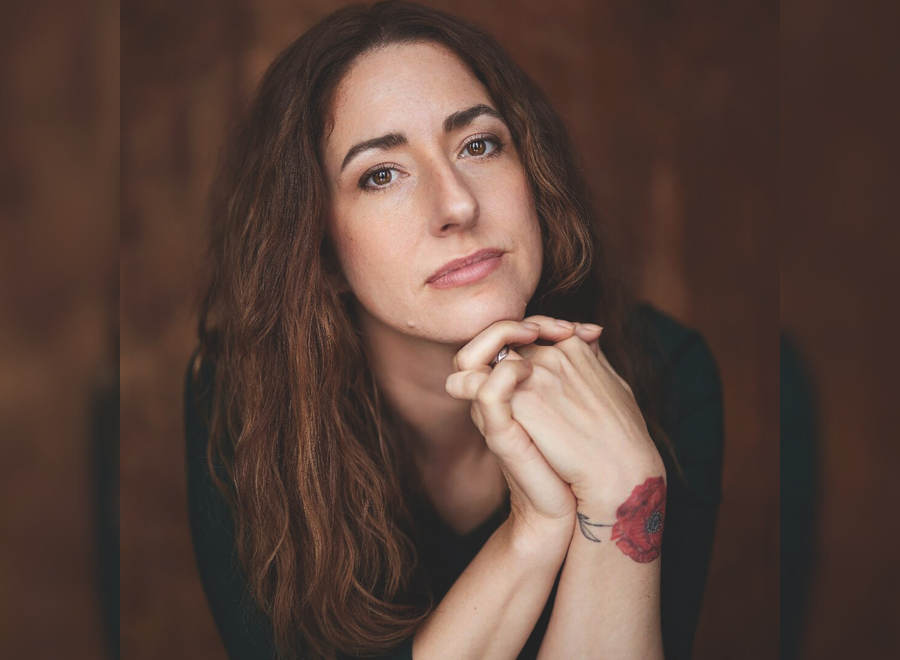A teenage girl cuts off her hair to avoid an arranged marriage. A young mother leaves her children behind and disguises herself as a virgin so she can make a pilgrimage to a distant land. An elderly nun defies a bishop and watches over a graveyard to prevent a corpse from being exhumed. These events are not the outlandish inventions of ancient fairytales but rather sacred history from the lives of women in the early church: Catherine of Siena, Margery Kempe and Hildegard of Bingen were mystics who rejected social custom or the strictures of established religion to respond to God’s surprising call for their lives.
Their stories and others are retold in The Mystics Would Like a Word: Six Women Who Met God and Found a Spirituality for Today by Iowa writer Shannon K. Evans. While Evans provides a concise introduction for each of her holy women, a historical overview is not her purpose or focus. Instead, she weaves the stories of her chosen mystics through the events of her own life as a Catholic in the 21st century, sharing the journey of her soul’s stretching and growing alongside wisdom from her spiritual matriarchs.
You may unsubscribe from any of our newsletters at any time.
As with her previous books, Feminist Prayers for My Daughter and Rewilding Motherhood, Evans offers inspiration for readers in pursuit of a fully embodied spiritual life.
The mystics we meet in Evans’s latest work are nuns, lay women and mothers; they are also artists, contemplatives and advocates for the poor and vulnerable. Despite the dramatic and at times shocking elements found in some of the mystics’ stories, Evans emphasizes that a deep relationship with God is the opportunity of every believer: “The word mystic has an otherworldly quality about it; we tend to associate it with hermits levitating on a hillside more than with regular people living pretty regular lives — much less with ourselves,” she writes. “But a mystic is really just someone who has experienced a glimpse of the eternal and has chosen to pursue more. Mysticism is not reserved for a select few but is an invitation extended to each of us.”
More on Broadview:
Contemplating her own life through this invitation proves its spiritual fruit. Even with many centuries between Evans and her subjects — most of her mystics are from the medieval period, with the exception of the 19th-century French nun Thérèse of Lisieux — Evans draws apt and insightful parallels between their struggles and her own.
She writes that the book was sparked by a meditation prompt that asked her to picture herself at the Last Supper. Wrestling with imagining her role amid the 12 male Apostles, Evans turned instead to Julian of Norwich, a 14th-century mystic who experienced religious visions and wrote of the divine feminine through the image of Christ as mother. In reading Julian’s Revelations of Divine Love, one of the earliest English books written by a woman, Evans discovered language for God’s nurturing love that resonated with her own experience of motherhood.
Each chapter in The Mystics Would Like a Word focuses on a similar turning point or season of transformation in Evans’s life, interpreted through the spirituality of a female mystic. While some chapters have more obvious connections to the mystics than others, the range of subjects presents a rich landscape for the reader to explore: learning environmental justice through Hildegard of Bingen’s viriditas or the “greening power” of God in nature; reclaiming bodily autonomy as a woman through Margery Kempe’s quest to attain spiritual virginity after spousal abuse; or embracing the power of a hidden life to resist influencer culture, inspired by the cloistered Thérèse of Lisieux.
In the book’s final chapter, Evans recounts her recent near-death experience and how it transformed her relationship with God. Battling septic shock in the ICU, followed by intense medical testing, Evans felt drawn to Catherine of Siena, an Italian mystic who confronted her own fear of mortality by caring for the terminally ill and accompanying condemned prisoners to their executions. This self-enforced, radical proximity to suffering taught Catherine how to embrace what repelled her; Evans, while lying on an MRI table, experienced a vision that helped her recognize God’s loving presence in the midst of her deepest fear.
The book is at its strongest when Evans delves into the spiritual mysteries of her own life, sharing with vulnerability how she has discovered God anew through the holy women who have gone before her. The Mystics Would Like a Word invites the reader to embark on a similar journey: to look for traces of the divine not only in the pages of history, but also in modern everyday life, an equally hallowed ground awaiting sacred contemplation.
***
Marie Trotter is a writer and PhD candidate at McGill University in Montreal.














